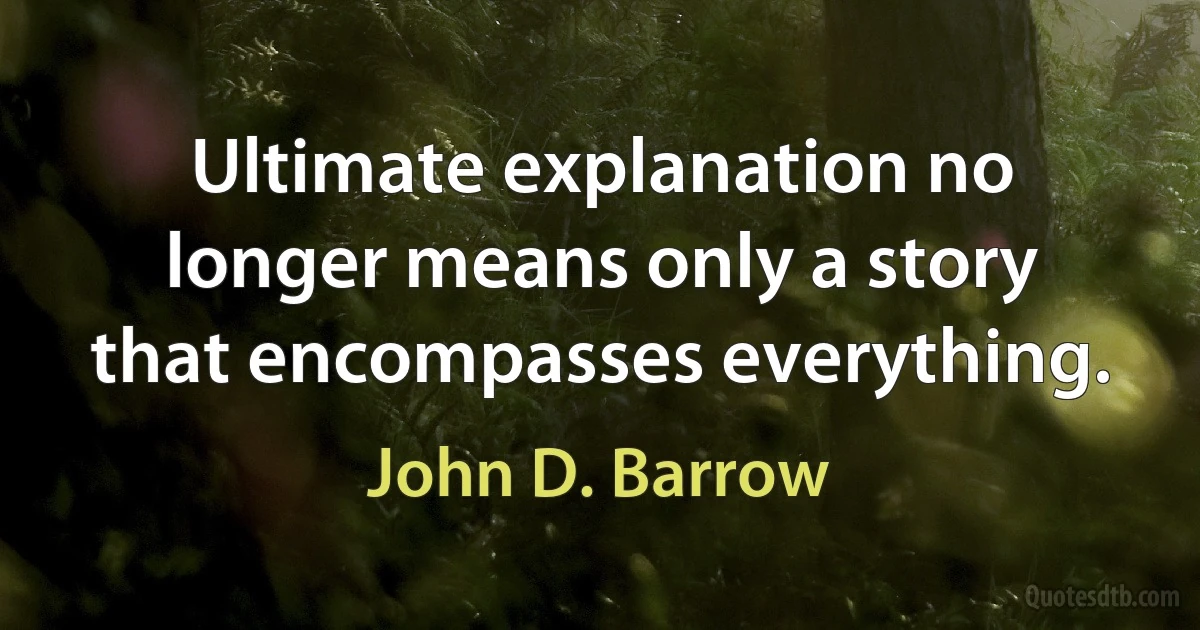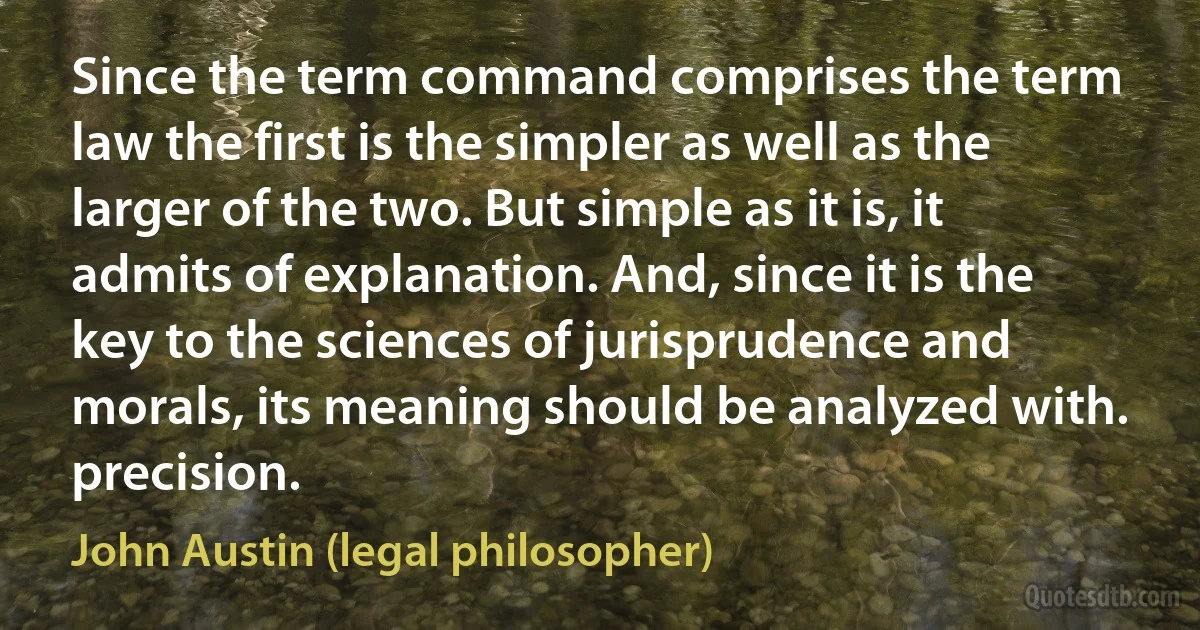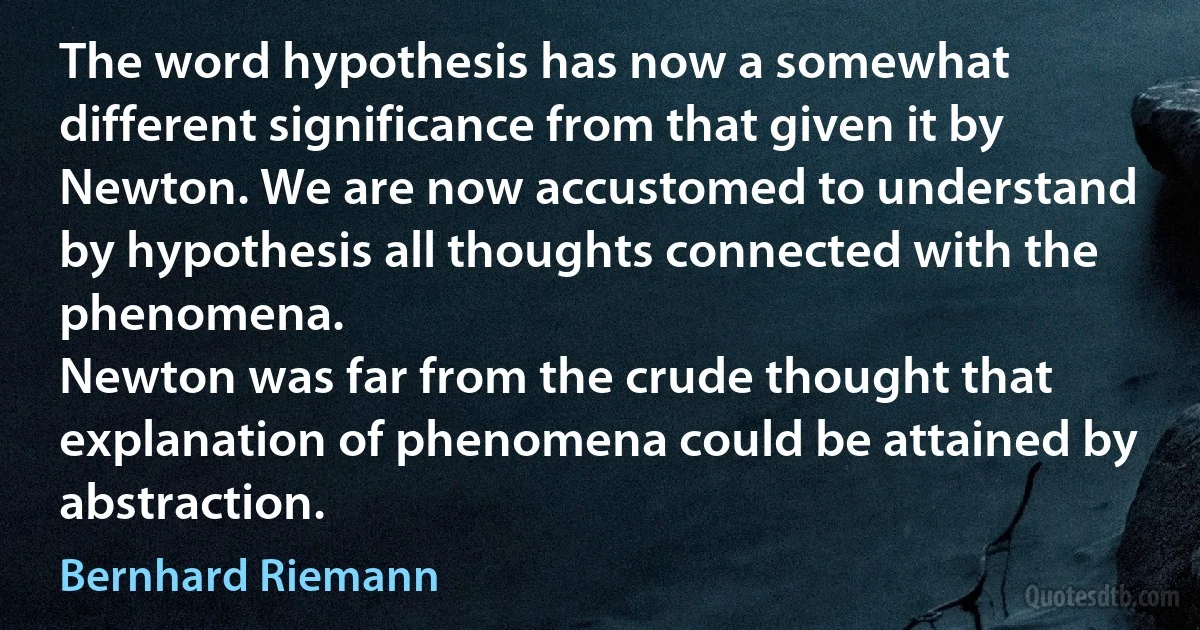Explanation Quotes - page 14
Opticks was out of harmony with the ideas of 19th-century physics. ...an exposition of the "wrong" (i. e., corpuscular) theory of light,-even though it also contained many of the basic principles of the "correct" (i. e., wave) theory. Not only had Newton erred in his choice... but also he apparently had found no insuperable difficulty in simultaneously embracing features of two opposing theories. ...by adopting a combination of the two theories at once, he had violated one of the major canons of 19th-century physics... Today our point of view is influenced by the theory of photons and matter waves, or the... complementarity of Niels Bohr; and we may read with a new interest Newtons ideas on the interaction of light and matter or his explanation of the corpuscular and undulatory aspects of light.

I. Bernard Cohen
But that the state in general sees as right the sole means of accepting interest-bearing loans - thus debts, when it needs money and applies its other sovereign rights today only in an underhand manner to collect the incurred debts from the people, these are conditions for which one seeks in vain for a reasonable explanation. There is indeed no reasonable explanation for it, but only the fact that our entire thought even in national financial political matters is directed or corrupted in a private capitalistic manner.

Gottfried Feder
At first it might seem that quantum mechanics (QM), which began with Einstein's photon as the explanation for the photoelectric effect in 1905, goes further in the direction of discreteness. But the wave-particle duality discovered by de Broglie in 1925 is at the heart of QM, which means that this theory is profoundly ambiguous regarding the question of discreteness vs. continuity. QM can have its cake and eat it too, because discreteness is modeled via standing waves (eigenfunctions) in a continuous medium.

Gregory Chaitin
Simon, always a fool for simplicity, accepted. Punch took an envelope out of his pocket and scribbled on the back of it. He said, 'This has a simple arithmetical proof but no rational explanation of the paradox.' He gave it to Simon. Simon read it, looked at Punch with raised eyebrows, hunched his shoulders, shook his head sadly, and got up and left the room without a word.

William Grey Walter
In developing my account of consciousness, I have tried to obey a number of constraints. The first and most important is to take consciousness seriously. The easiest way to develop a "theory" of consciousness is to deny its existence, or to redefine the phenomenon in need of explanation as something it is not. This usually leads to an elegant theory, but the problem does not go away.

David Chalmers
From the methodological standpoint, however, we see that 'mechanism' and 'vitalism' by no means form the mutually exclusive disjunction they have been supposed to do. If a 'non-mechanist' wishes to deny the assumption of methodological mechanism that biological explanations must also be physico-chemical ones, it is obviously by no means intended that the required explanation must be 'vitalistic', i. e. involving the assumption that in living organisms factors analogous to psychical ones are 'at work'. A 'non-mechanistic' theory which is not all 'vitalistic' thus appears to be logically possible, and if we make a critical study of mechanism and vitalism this possibility will be seen to be of special importance.

Ludwig von Bertalanffy
[Jensen] does not believe that [heritability] estimates alone can decide the issue of genetic versus environmental hypotheses. However, he argues that the probability of a genetic hypothesis will be much enhanced if, in addition to evidencing high [heritability], we find we can falsify literally every plausible environmental hypothesis one by one. He challenges social scientists who believe in an environmental explanation of the IQ gap between the races to bring their hypotheses forward. Given his competence and the present state of the social sciences, the result is something of a massacre.... Far too many of Jensen's critics have not taken up the challenge to refute him in any serious way, rather they have elected for various forms of escape, the most popular of which has been to seize on an argument put forward by the distinguished Harvard geneticist Richard C. Lewontin.

James Robert Flynn
Slave-owning culture ... gives rise to the teleological explanation of the Universe, which reaches its subtlest form in Plato's or Aristotle's philosophies, in which all phenomena are determined by Ideas or Forms. These correspond to the plans formed in the mind of the slave-owner which his slave passively fulfils.

Christopher Caudwell
Grosseteste appears to have been the first medieval writer to recognize and deal with the two fundamental methodological problems of induction and experimental verification and falsification which arose when the Greek conception of geometrical demonstration was applied to the world of experience. He appears to have been the first to set out a systematic and coherent theory of experimental investigation and rational explanation by which the Greek geometrical method was turned into modern experimental science. As far as is known, he and his successors were the first to use and exemplify such a theory in the details of original research into concrete problems.

Alistair Cameron Crombie
When you understand the basic change taking place in any one major area, it is easier to make sense of the others. This discovery of a new pattern transcends explanation. The shift is qual-itative, sudden, the result of neurological processes too rapid and complex to be tracked by the conscious mind. Although logical explanations can be laid out up to a point, the seeing of a pattern is not sequential but all-at-once. If a new concept does not click into place for you on first encounter, read on. As you move through the book you will come upon many related ideas, connections, examples, metaphors, analogies, and illustrative stories. In time, patterns will emerge, the shifts will occur. From the new perspective, old questions may seem suddenly irrelevant.

Marilyn Ferguson
If running a productive, Western-style economy were simply a matter of culture, it should be possible for African and Middle Eastern countries to import Western institutions and business methods, just as East Asian countries have done. But this is evidently not a straightforward task. Though it was justifiable at first to blame the evils of colonialism, two generations or more have now passed since most foreign powers withdrew from Africa and the Middle East, and the strength of this explanation has to some extent faded.

Nicholas Wade
[W]e shall be concerned with the general nature of pure mathematics, and how it is distinguished from other sciences. Here there are... two distinct categories of things of which an account must be given-the ideas or concepts of mathematics, and the propositions of mathematics. ...the great majority of writers on the subject have concentrated their attention on the explanation of one or the other... and erroneously supposed that a satisfactory explanation of the other would immediately follow.

Frank P. Ramsey
I treat all film roles one way: very seriously," exclaims Pleasence. "I never play anything tongue-in-cheek, though at times it might appear that way. I'm a professional actor who has no particular approach to acting. I get the part, I read the script. If I decide to do it, I learn the lines. People expecting a longwinded explanation on my approach will be disappointed. I have no theory about acting. There is no method, there is no way. I just do it.

Donald Pleasence
Our science fails to recognize those special properties of life that make it fundamental to material reality. This view of the world-biocentrism-revolves around the way a subjective experience, which we call consciousness, relates to a physical process. It is a vast mystery and one that I have pursued my entire life. The conclusions I have drawn place biology above the other sciences in the attempt to solve one of nature's biggest puzzles, the theory of everything that other disciplines have been pursuing for the last century. Such a theory would unite all known phenomena under one umbrella, furnishing science with an all-encompassing explanation of nature or reality.

Robert Lanza
An explanation of a phenomenon is regarded, apparently instinctively, as the most general possible when it is a mechanical explanation. The "mechanism" of the process is the ultimate goal of experiment. Now this mechanism in general lies beyond the range of the senses; either by reason of their limitations, as in the case of the atomic structure of matter, or by the very nature of the supposed mechanism, as in the theory of the ether. The only way to bridge the gap between the machinery of the physical process and the world of sense-impressions is to think out some consequence of that mechanism. This we will call the hypothesis. The hypothesis, resting still on the mechanical basis, is yet beyond the range of direct experimental investigation; but if, by mathematical reasoning, a consequence of the hypothesis can be deduced, this will often lie within the range of experimental inquiry, and thus a test of the soundness of the original mechanical conception may be instituted.

J. R. Partington
An immediate consequence of these principles of explanation is that the souls of organic beings, i. e., the compacts of mind-masses, arisen during life, continue to exist after death. (Their isolated persistence is not sufficient). But in order to explain the orderly development of organic nature in which the earlier collected experiences obviously serve as basis for the later creations, it is necessary to assume that these mind-masses enter into a greater compact of mind-masses, the Earth-Soul, and that these serve a higher soul-life according to the same laws as the mind-masses engendered in our nerve-processes observe in their service of our own soul-life.

Bernhard Riemann
Zend-Avesta, a truly life giving word creating new life in knowledge as in faith! ...As Fechner in his Nanna sought to show that plants have souls, so the point of departure of his contemplations in the Zend-Avesta is the doctrine that the stars have souls. The method he employs is not that of the abstraction of general laws by induction and the application and testing of these in the explanation of nature, it is analogy. He compares the earth with our own organism, which we know to be endowed with a soul. He searches out not merely in a one-sided way the similarities, but does equal justice to the dissimilarities, too, and so arrives at the conclusion that all the former show the earth to be a being with a soul, and that all the latter indicate that it is a being with a soul far higher than our own.

Bernhard Riemann
The statement is so frequently made that the differential calculus deals with continuous magnitude, and yet an explanation of this continuity is nowhere given; even the most rigorous expositions of the differential calculus do not base their proofs upon continuity but, with more or less consciousness of the fact, they either appeal to geometric notions or those suggested by geometry, or depend upon theorems which are never established in a purely arithmetic manner. Among these, for example, belongs the above mentioned theorem, and a more careful investigation convinced me that this theorem, or any one equivalent to it, can be regarded in some way as a sufficient basis for infinitesimal analysis. It then only remained to discover its true origin in the elements of arithmetic and thus at the same time to secure a real definition of the essence of continuity. I succeeded Nov. 24, 1858.

Richard Dedekind



